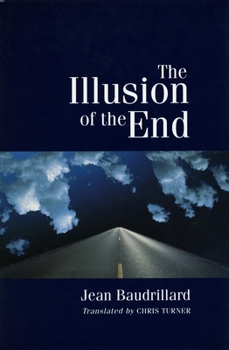The Illusion of the End
Select Format
Select Condition 
Book Overview
The year 2000, the end of the millennium: is this anything other than a mirage, the illusion of an end, like so many other imaginary endpoints which have littered the path of history?
In this remarkable book Jean Baurdrillard--France's leading theorist of postmodernity--argues that the notion of the end is part of the fantasy of a linear history. Today we are not approaching the end of history but moving into reverse, into a process of systematic obliteration. We are wiping out the entire twentieth century, effacing all signs of the cold War one by one, perhaps even the signs of the First and Second World Wars and of the political and ideological revolutions of our time. In short, we are engaged in a gigantic process of historical revisionism, and we seem in a hurry to finish it before the end of the century, secretly hoping perhaps to be able to begin again from scratch.
Baudrillard explores the "fatal strategies of time" which shape our ways of thinking about history and its imaginary end. Ranging from the revolutions in Eastern Europe to the Gulf War, from the transformation of nature to the hyper-reality of the media, this postmodern mediation on modernity and its aftermath will be widely read.






